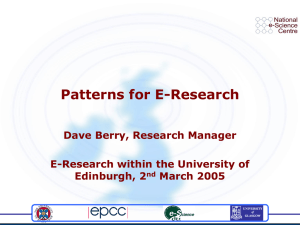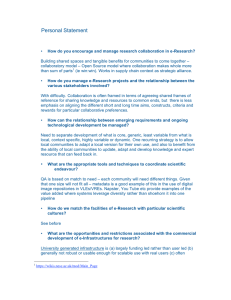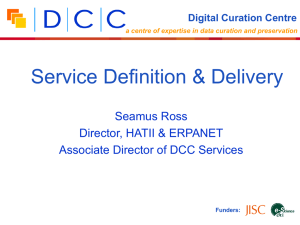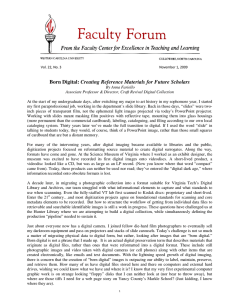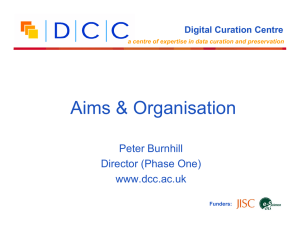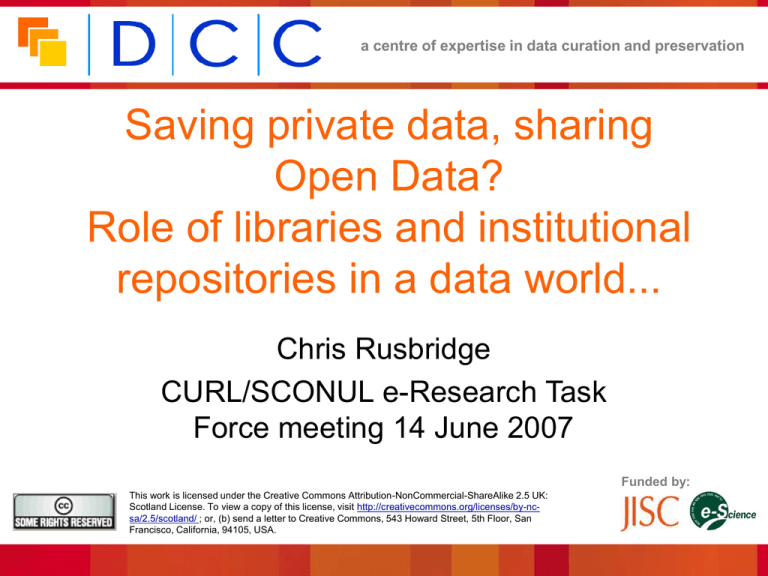
a centre of expertise in data curation and preservation
Saving private data, sharing
Open Data?
Role of libraries and institutional
repositories in a data world...
Chris Rusbridge
CURL/SCONUL e-Research Task
Force meeting 14 June 2007
Funded by:
This work is licensed under the Creative Commons Attribution-NonCommercial-ShareAlike 2.5 UK:
Scotland License. To view a copy of this license, visit http://creativecommons.org/licenses/by-ncsa/2.5/scotland/ ; or, (b) send a letter to Creative Commons, 543 Howard Street, 5th Floor, San
Francisco, California, 94105, USA.
a centre of expertise in data curation and preservation
Welcome
• 2
CURL/SCONUL e-Research
a centre of expertise in data curation and preservation
Contents
• Role of libraries
• How we should start dealing with data
• AHDS decision implications…
• 3
CURL/SCONUL e-Research
a centre of expertise in data curation and preservation
Digital Curation Centre Mission
“The over-riding purpose of the DCC is to
support and promote continuing improvement
in the quality of data curation, and of
associated digital preservation”
• 4
CURL/SCONUL e-Research
a centre of expertise in data curation and preservation
Role of Research Libraries?
•
•
•
•
•
• 5
Research Collections
Special collections
Research space & facilities
Services (eg ILL)
+++
CURL/SCONUL e-Research
a centre of expertise in data curation and preservation
Role of Research Libraries?
•
•
•
•
•
• 6
Research Collections… going virtual
Special collections
Research space & facilities… for students
Services (eg ILL)… going virtual
Diminishing strategic importance?
CURL/SCONUL e-Research
a centre of expertise in data curation and preservation
Role of Research Libraries?
• Major service organisation at heart of
University
• Addresses institutional priorities
• Skills in organisation of knowledge
• Significant budget
• “Hearts & Minds”
• 7
CURL/SCONUL e-Research
a centre of expertise in data curation and preservation
Role of Research Libraries?
• The right place to build infrastructure for
institutional knowledge capital?
•
•
•
•
Yes! But don’t under-estimate…
The scale of change needed
How much your legacy (and skills!) drag you back
The need for domain knowledge
Data are different!
• 8
CURL/SCONUL e-Research
a centre of expertise in data curation and preservation
“The Records of Science”
• Data increasingly important as evidence
• Key part of the scholarly record (public good)
• Unrepeatable observations & experiments
• Value for public money (eg OECD)
• Experimental verifiability (the basis of science)
• Would Chang retractions have been reduced if his first data
were available?
CHANG, G., ROTH, C. B., REYES, C. L., PORNILLOS, O., CHEN, Y.-J. & CHEN, A. P. (2006)
Retraction of Pornillos et al., Science 310 (5756) 1950-1953. Retraction of Reyes and Chang, Science
308 (5724) 1028-1031. Retraction of Chang and Roth, Science 293 (5536) 1793-1800. Science
Magazine, 314. http://www.sciencemag.org/cgi/content/full/314/5807/1875b
• Allows additional interpretations
• Legal and compliance (eg emerging RC mandates)
• 9
CURL/SCONUL e-Research
a centre of expertise in data curation and preservation
OECD declaration
• “…Work towards the establishment of access regimes for digital
research data from public funding in accordance with the following
objectives and principles:
•
•
•
•
•
•
•
•
•
•
• 10
Openness
Transparency
Legal conformity
Formal responsibility
Professionalism
Protection of intellectual property
Interoperability
Quality and security
Efficiency
Accountability”
CURL/SCONUL e-Research
a centre of expertise in data curation and preservation
Repositories
• Document / article repositories
• simple metadata (discovery, description)
• ePrints, DSpace, Fedora, ePubs….
• e-Research repositories
• more complex metadata (discovery, description, usage control,
software parameters…)
• ‘homebrew’ systems – portals to research datasets and software
•Slide from Keith Jeffery
• 11
CURL/SCONUL e-Research
a centre of expertise in data curation and preservation
Not only work with
the e-literature
repository but
also…..
Scenario
•Current Research Infrastructure Service
• project, person, organisational unit, research
output (products, patents, publications),
funding, facilities, equipment, events……
•e-Research repository
• research datasets, software
•e-Research
application
middleware
• control experiments, take data, visualisation,
in-silico experiments (simulation)
•e-Process
• Workflows, research applications, travel
requests, claims
•Slide from Keith Jeffery
• 12
CURL/SCONUL e-Research
a centre of expertise in data curation and preservation
Retaining research data means…
•
•
•
•
Data secure against loss (within group)
Communal repository (secure data store)
Re-usable, sharable information
As above, plus active curation (eg bioinformatics)
• Long term preservation of information
• Be clear what you are trying to do!
• 13
CURL/SCONUL e-Research
a centre of expertise in data curation and preservation
… or the data trajectory is…
• Hard drive lost (crash)
• Hard drive DVD Cardboard box Loft Skip/dumpster
lost
• Sometimes this is a very bad thing
• Sometimes these are the right options!
• 14
CURL/SCONUL e-Research
•© Marita Bushell
a centre of expertise in data curation and preservation
Preservation risks
•
•
•
•
•
•
•
•
•
• 15
Not caring enough to try
No permissions to do it (or don’t know what permissions we have!)
Insufficient contextual information to interpret
Human error
Media failure
Lack of money
Policy failure
Deliberate attack
Obsolescence of format
CURL/SCONUL e-Research
a centre of expertise in data curation and preservation
Preservation
• “Preservation starts before creation”
• Not in many IRs!
• Where must lifecycle involvement start?
• 16
CURL/SCONUL e-Research
a centre of expertise in data curation and preservation
• 17
CURL/SCONUL e-Research
a centre of expertise in data curation and preservation
What to do about curation
• Build curation/reusability into science workflow
•
•
•
•
•
•
• 18
Curation begins before creation
What’s easy at first becomes (impossibly) hard later
Describe data (metadata schemas, “representation info”, etc)
Keep experimental parameters (technical, who, what, when, where)
Keep ability to process
Keep data!
CURL/SCONUL e-Research
a centre of expertise in data curation and preservation
What to do about curation - 2
• Use standard/agreed formats for data
• Make ownership & restrictions clear, &
explain how to cite data
• Offer for deposit in institutional or discipline
repository
• Appraisal and selection essential
• Possible time-limited embargos
• “Publish” data in support of articles
• 19
CURL/SCONUL e-Research
a centre of expertise in data curation and preservation
Internet Archaeology: publication with
data
• 20
CURL/SCONUL e-Research
a centre of expertise in data curation and preservation
Database as book…
• Buneman (early pilot)
work on IUPHAR
database
• MySQL to XML
database
• Historic to logical schema
• XML via XSLT to LaTeX
• 21
CURL/SCONUL e-Research
a centre of expertise in data curation and preservation
Institutional repositories and data
• Institutional repository managers
• Make contact with emerging institutional data services
• Start raising awareness of the need to curate rather than just dump
data
• Start thinking about the relationship of data to publications
(especially e-theses)
• Start thinking about the metadata needed to find and re-use data
• Make contact with key researchers
• Start thinking about their data…
• 22
CURL/SCONUL e-Research
a centre of expertise in data curation and preservation
What kinds of data?
• Observations
• eg UARS (Upper Atmosphere) Level 0: telemetry
• UARS Level 1: measured physical parameters (post
calibration?)
• Derived data
• UARS Level 2: calculated geophysical? profiles
• UARS level 3: gridded, interpolated?
• Combined data
• Crafted data
• Eg annotated gene/protein databases
• Descriptive (meta)data
• 23
CURL/SCONUL e-Research
a centre of expertise in data curation and preservation
StORe: Source data formats
• 24
CAD/GIS:
39
Extensible mark-up language (XML):
35
Database files (e.g. Access, MySQL):
117
Flat files (e.g. FITS):
66
Hypertext mark-up language (HTML):
60
Image files (e.g. .jpg, .tif, .bmp, .gif):
228
Plain text (.txt):
179
Portable document format (.pdf):
156
Rich text files (.rtf):
53
Spreadsheets (e.g. Excel/.xls):
220
Statistical software:
75
Tables/catalogues:
102
Word processed files (e.g. Word/.doc):
220
Other (please specify):
76
•Slide from StORe project
CURL/SCONUL e-Research
a centre of expertise in data curation and preservation
StORe: the other data formats?
They said the 76 other formats included:
+latex+.cc source code, .cif (crystallographic data),
.pdb, .mtz, .pool, .root, .raw, .swf, .fla, .raw, .mpg,
binary files, chemdraw cdx, xwin nmr files, .ps files,
.fla, .swf, masslynx files, derived data in PAw-format
ntuples, raw mass spectrometry data, X-ray
diffraction data, kaleidagraphs, Atlas/ti hermeneutic
unit files, C++/shell scripts, Fourier induction decay
files, etc., etc., etc., etc………..
• 25
•Slide from StORe project
CURL/SCONUL e-Research
a centre of expertise in data curation and preservation
StORe: the other data formats - more
They also said such things as:
“It is stored in a database, but nothing so simple as an
Access file! It's one of the largest databases in the world!
The format is Kanga/Root and previously was
Objectivity. I think it's of the order of Picobytes in size.”
And:
“God preserve us from idiots who archive data in
proprietary commercial formats (Excel spreadsheets and
MS-word documents)!”
• 26
•Slide from StORe project
CURL/SCONUL e-Research
a centre of expertise in data curation and preservation
Data resource stages
• Curated data is created…
• Observations? Fixed!
• Or Acquired…
• Data brought/bought from outside
• Ingest
• Development
• Derived, refined, combined, processed data
• Potentially many stages
• 27
CURL/SCONUL e-Research
a centre of expertise in data curation and preservation
What are the reusability issues?
• Data not neutral; highly contextual!
• Hard to know the risks & pitfalls of a particular
dataset
• Data not self-describing: hard to find
appropriate data (but see Murray-Rust on
Googling InChI etc)
• Hard to “understand” data once found
• Really need information, not data!
• Hard to use data once understood
• 28
CURL/SCONUL e-Research
a centre of expertise in data curation and preservation
Context
• Data meaningless without context
• Metadata of many kinds
• Representation information… from data to
information
• Linkage and connection between datasets
• Provenance
• Authenticity/integrity
• Computational lineage
• 29
CURL/SCONUL e-Research
a centre of expertise in data curation and preservation
But the problem with metadata is
•It takes too much effort for the researcher to put it in
(many web-form-screens)
•So have to input incrementally, no repetition, using the
workflow..
•And not re-keying data stored already elsewhere in
other (linked-up) systems
•Slide from Keith Jeffery
• 30
CURL/SCONUL e-Research
a centre of expertise in data curation and preservation
Access and re-use
• Ethics and rights control access
• Weak in expressing this long-term
• Collaboration tools
• Annotation, discussion, review (see DART…)
• Re-use leading to change and development
• “Publication”
• Not just in “print”
• Underlying data should be “published”, too
• 31
CURL/SCONUL e-Research
a centre of expertise in data curation and preservation
Institutional Repositories
• Now largely text
• OpenDOAR: only 5 Institutional Repositories claim to include
datasets
•
•
•
•
•
Bristol
Cambridge
Edinburgh
Leicester
Southampton
• …and some of these seem doubtful on inspection!
• … of course not all research data are “datasets”
• 33
CURL/SCONUL e-Research
a centre of expertise in data curation and preservation
ERA
• 34
CURL/SCONUL e-Research
a centre of expertise in data curation and preservation
Repository types
• 35
CURL/SCONUL e-Research
a centre of expertise in data curation and preservation
Repository challenges
• Data are different: you’ll need access to some domain knowledge
• Appraisal/selection harder
• Broader range of formats
• Appropriate “standards” for longevity? XML-based?
• What metadata are needed?
•
•
•
•
• 36
Descriptive, to find the dataset
Context and background
Provenance
“Representation information” to connect data to information (whatever
gives meaning to data for the “designated community”)
CURL/SCONUL e-Research
a centre of expertise in data curation and preservation
Repository challenges - 2
• May distort your repository
•
•
•
•
Size
Number of objects
Rate of deposit
Nature of use
• Databases may be dynamic
• Databases may need to be accessed in situ
• Rights and ethical limitations hard to describe and
enforce
• Need to build links to publications (cf StORe)
• Need to build discipline links across repositories…
• 37
CURL/SCONUL e-Research
a centre of expertise in data curation and preservation
Repository challenges - 3
• Is your platform suitable?
• Most successful (ie older) data repositories
are DIY
• Data also held in repositories built on
Dspace, ePrints and Fedora
• 38
CURL/SCONUL e-Research
a centre of expertise in data curation and preservation
Repositories?
• SH: “The trouble with many Institutional Repositories is
that they are not run by researchers but by permissions
professionals...”
• PMR: “I have had similar thoughts. I got the distinct
impression that some IRs are run like Victorian
museums - look but don’t touch. The very word
repository suggests a funereal process - it’s no surprise
that having put much of my stuff into DSpace I find it’s
an enormous effort to get it out. Why don’t we build
disseminatories instead?”
•From Peter Murray Rust’s blog
• 39
CURL/SCONUL e-Research
a centre of expertise in data curation and preservation
What is a Repository? - revisited
• from the perspective of the content consumer a
repository is just a Web site
• think existing Web presences… think BBC… think
museum… think Flickr…
• think content management systems
• are these Web sites or repositories?
• who cares?
• but conceptualising the repository as a Web site
changes priorities
• Web architecture, Google, usability, accessibility, …
•Slide from Andy Powell
• 40
CURL/SCONUL e-Research
a centre of expertise in data curation and preservation
Real Open Access?
• PMR: But the problem with the repositories is that
there is no indication that the actual thesis is
OpenAccess. The Edinburgh repository announces:
All items in ERA are protected by copyright, with all
rights reserved… which discourages the visitor for
looking for an Open Licence within the thesis.
• PMR: Here is a very simple idea: Add dc:rights to
the splash page and metadata and proudly proclaim
in large letters:
THIS THESIS CARRIES A CREATIVE COMMONS
LICENCE - ENJOY!
•From Peter Murray Rust’s blog
• 41
CURL/SCONUL e-Research
a centre of expertise in data curation and preservation
Open Data
• More than open access…
• Includes the right to process the content
• Plus the capability to process the content
• Implies data-oriented metadata within the content
• Microformats?
Datuments?
• 42
CURL/SCONUL e-Research
a centre of expertise in data curation and preservation
• 43
CURL/SCONUL e-Research
a centre of expertise in data curation and preservation
• 44
CURL/SCONUL e-Research
a centre of expertise in data curation and preservation
Who are the curation players?
• 46
CURL/SCONUL e-Research
a centre of expertise in data curation and preservation
Who are the curation players?
• 47
CURL/SCONUL e-Research
a centre of expertise in data curation and preservation
AHDS
• “AHRC Council has decided to cease funding the Arts and
Humanities Data Service (AHDS) from March 2008. […] Grant
holders must make materials they had planned to deposit with the
AHDS available in an accessible depository for at least three years
after the end of their grant”
• AHRC Press Release 14/05/2007
• (Note petition at http://petitions.pm.gov.uk/AHDSfunding/)
• Does not apply to Archaeology: ADS still funded?
• “Council believes that long term storage of digital materials and
sustainability is best dealt with by an active engagement with HEIs
rather than through a centralised service”
• “JISC has decided that it is unable to fund the service alone and
that therefore its own funding of the service will, in its current form,
cease on the same date. […] exploring with the AHDS … and the
wider community alternative approaches to maintaining strong
support for that community beyond March 2008”
• JISC Press Release 13/06/2007
• 48
CURL/SCONUL e-Research
a centre of expertise in data curation and preservation
Repatriating resources?
• Complexity:
multimedia
(text DB,
image DB,
video
interviews,
VRML
models)
• 49
CURL/SCONUL e-Research
a centre of expertise in data curation and preservation
Repatriating Edinburgh resource?
•
Different content:
Access database
• “collection of
3.5K
bibliographic
entries on
secondary
literature on
avant-garde and
neo-avant-garde
related themes”
•
• 50
Documentation
CURL/SCONUL e-Research
a centre of expertise in data curation and preservation
New challenge?
• Can we find a way to combine sustainability
(but generality) of institutional repositories
with science focus (aiming to reduce the high
risk) of domain repositories?
• Some sort of domain repository in the network
space?
• 51
CURL/SCONUL e-Research
a centre of expertise in data curation and preservation
Financial sustainability: the 8 pillars
of wisdom?
• Someone has to pay…
•
•
•
•
Consumer pays: subscription or usage?
Depositor pays (ie grant or institution)?
Institution pays (IR, cf library/archive/museum)
Community (discipline repository?) pays
• Government, or science funder
• Learned society?
• Volunteers (cf open source, social computing, LOCKSS)?
• Side effect (advertiser) pays (unlikely for much data?)
• Endowment or donor pays…
• Diversity?
• 53
CURL/SCONUL e-Research
a centre of expertise in data curation and preservation
Role of libraries
• 2-4% of university budgets (“There’s plenty of
money… there’s just not plenty of money for
everything!” Courant)?
• Traditional role in sustaining the raw material
of scholarship
• Looking for new roles in the digital world?
• Many unsaid assumptions from publishing
paradigm?
• Domain knowledge: wide but not deep
• Involvement in data creation low
• 54
CURL/SCONUL e-Research
a centre of expertise in data curation and preservation
Thank you
c.rusbridge@ed.ac.uk
• 55
CURL/SCONUL e-Research


